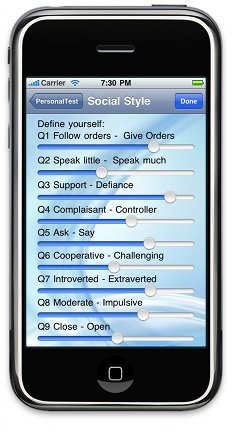The Social Style test, it will help your social relations with others, through appreciation of basic decision-making and control needs. Improve your social versatility with your coworkers, your family and friends with the knowledge of your social style and the people close to you. is a tool for understanding our basic behaviors and how individuals prefer different behavioral styles. It's the most rigorously tested and practical approach for identifying and building interpersonal skills in business and organizational settings.
Allow individuals to discover their Social Style, based on their preferred behaviors. The profile evaluates the individual's assertive and responsive behaviors.
 |
-
Assertiveness
is the degree to which you tend to ask or tell during interactions. (horizontal scale) E.g. Do you quietly ask your colleagues "Would you like to go to lunch?" or loudly announce "Let's go to lunch.?".
-
Responsiveness
is the degree to which you tend to control or emote. (vertical scale)E.g., do you keep your emotions to yourself or outwardly display how you feel?
|
By combining assertive and responsive behaviors, a person is charted in one of four quadrants, or Social Style positions:
Analyticals
Analyticals value facts above all, and may appear uncommunicative, cool and independent. They have a strong time discipline coupled with a slow pace to action. They value accuracy, competency and logic over opinions, often avoiding risk in favor of cautious, deliberate decisions. Analyticals are usually cooperative, providing they have some freedom to organise their own efforts. Power often arises suspicion in Analyticals, but if they come to see it as necessary for achieving goals and objectives, they may seek power themselves. In relationships, Analyticals are initially more careful and reserved, but once trust is earned they can become dedicated and loyal.
Amiables
Amiables are people-oriented, and care more about close relationships than results or influence. They usually appear warm, friendly and cooperative. Amiables tend to move slowly with a low time discipline, minimising risk and often using personal opinions to arrive at decisions. Belonging to a group is a primary need, and Amiables may make every effort to gain acceptance. They typically seek to uncover common ground, preferring to achieve objectives through understanding and mutual respect rather than force and authority. When managed by force without relationship, Amiables appear to cooperate initially but will likely lack commitment to the objectives and may later resist implementation.
Expressives
Expressives are motivated by recognition, approval and prestige. They tend to appear communicative and approachable, often sharing their feelings and thoughts. They move quickly, continually excited about the next big idea, but they often don't commit to specific plans or see things through to completion. Expressives enjoy taking risks. When making decisions, they tend to place more stock in the opinions of prominent or successful people than in logic or research. Though they consider relationships important, the Expressive's competitive nature leads them to seek quieter friends who are supportive of their dreams and ideas, often making relationships shallow or short-lived.
Driving
Driving styles want to know the estimated outcome of each option. They are willing to accept risks, but want to move quickly and have the final say. In relationships, they may appear uncommunicative, independent and competitive. Driving styles tend to focus on efficiency or productivity rather than devoting time and attention to casual relationships. They seldom see a need to share personal motives or feelings. Driving styles are results-oriented, tending to initiate action and give clear direction. They seek control over their environment.


